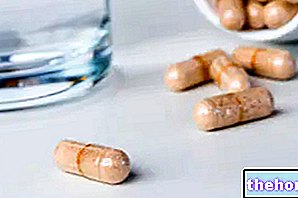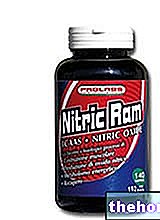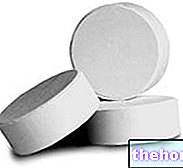FORMAT
Pack of 48/120/210/240 capsules of 1 gram
COMPOSITION
Fish oil standardized in Omega 3 (75%);
Gelatin;
Resistance agent: glycerol;
Antioxidants: Vitamin E, ascorbyl palmitate, rosemary extract;
Acidifier: citric acid.
NUTRITIONAL INFORMATION
Per 1 gram capsule
EPA 400 mg
DHA 200 mg
Omega 3 750 mg
Another prerogative of this product is the absence of the fish flavor, which generally accompanies most of the supplements of this kind, and which can objectively be measured through a patented analytical technique known as FAST.
The high cost that characterizes this omega three supplement is therefore totally justified by a very high certified quality.
Omega 3 fatty acids - series of polyunsaturated fatty acids characterized by the presence of double bonds, the first of which is present at the level of the third carbon starting from the terminal one. Although this class of lipids includes different types of molecules, the fatty acids to which a benefit in terms of biological functionality is ascribable are essentially three:
L "alpha linolenic acid (ALA): fatty acid with 18 carbon atoms with 3 double bonds, present in products of vegetable origin such as walnuts (4 walnuts are able to provide about 1.8 grams of ALA) and seeds and linseed oil. Alpha linolenic acid is the substrate of the elongase and desaturase enzymes, whose activity is linked to the endogenous synthesis, albeit minimal, of EPA and DHA.
Eicosapentaenoic acid (EPA) and docosahexaeonic acid (DHA): respectively characterized by a carbonaceous skeleton of 20 and 22 carbon atoms, and by 5 and 6 double bonds. The main food source of these products is given by fish and algae, from which it is generally extracted.
Even if the human organism is able to provide for the synthesis of these products, the total quota reached is absolutely not able to satisfy the daily demand, therefore it is necessary to resort to food intake. It has been estimated that the consumption of 4 portions of fish a week, perhaps alternating with the intake of nuts or other seeds rich in ALA, may be sufficient to satisfy the nutritional needs of even adults, whose daily requirement seems to be around. around 2 grams.
Omega 3 and well-being
Omega 3 fatty acids have assumed a very important role in maintaining human well-being. Old experimental evidence, in fact, attributed to these acids (in particular to fish consumed in the diet) the reason for the low incidence of cardiovascular events in the population. Only after a few years of studies and a lot of research, the biological role of these molecules involved in:
- Improve blood fluidity and reduce vascular pressure;
- Protect the heart from arrhythmias and conduction disturbances;
- Reduce the secretion of inflammatory cytokines, and protect the body from excessive inflammatory stress;
- Preserve and improve neuronal function;
- Protect from certain pathologies, including tumors (still in the experimental phase).
In reality, all these biological effects are not exclusively linked to the intake of omega 3, but rather to the rebalancing of a very important ratio (omega6 / omega3), decidedly unbalanced in Western nutrition and responsible for the high incidence of cardiovascular diseases.
Omega 3 and sport
Given the importance for human health, and given the physical and psychological stress to which an athlete, especially if an agonist, is subjected, it was decided to experiment with the use of omega three also in sports dietetics, in order to reduce the damage induced by physical exercise and protect the athlete from possible injuries and associated pathologies. It was thus possible to observe how correct integration with omega 3 is not only crucial for the protective action, but can also guarantee an improvement of some conditions necessary to support athletic performance. More precisely, supplementation with omega 3 has proved useful In the:
- Reduce exercise-induced inflammatory damage, and prevent functional and structural deterioration of muscles, tendons and ligaments;
- Support cardiac function, reduce vascular resistance and improve the athlete's hemodynamic abilities;
- Improve ventilatory capacities, and ensure better general oxygenation;
- Speed up reaction times and improve the concentration skills of competitive athletes.
Of course, it is also important for athletes to ensure a correct balance between omega3 and omega6, and the greater daily requirement in absolute value of omega 3 is justified by a relative increase in omega 6, due to diets particularly rich in products of animal origin and vegetable oils.
, in order to maintain a ratio between these two categories between 2: 1 and 6: 1.Omega-three intake should be prolonged for at least 4 weeks and preferred during meals, in order to facilitate bile-mediated intestinal absorption. able to assist its protective action on the stability of plasma membranes.
Furthermore, in order for supplementation to guarantee the effects described, the diet must also follow the general principles of a healthy diet and be accompanied by controlled physical exercise.
. 2007 Jul; 6: 230-6.
Omega-3 fatty acids and athletics.
Simopoulos AP.
Am J Clin Nutr. 2007 Mar; 85: 803-7.
n-3 Fatty acids are positively associated with peak bone mineral density and bone accrual in healthy men: the NO2 Study.
Högström M, Nordström P, Nordström A.
J Psychiatr Res. 2008 Jan; 42: 58-63. Epub 2006 Oct 30.
Omega-3 fatty acids on the forced-swimming test.
Huang SY, Yang HT, Chiu CC, Pariante CM, Su KP.
Eur J Appl Physiol. 2004 Aug; 92 (4-5): 584-91. Epub 2004 Mar 30.
Effect of n-3 fatty acids on free tryptophan and exercise fatigue.
Huffman DM, Altena TS, Mawhinney TP, Thomas TR.
Crit Care Clin. 2010 Jul; 26: 501-514.
Fish Oil in Critical Illness: Mechanisms and Clinical Applications.
Stapleton RD, Martin JM, Mayer K.
J Alzheimers Dis. 2010 Jul 15. [Epub ahead of print]
Omega-3 Fatty Acids, Cognitive Decline, and Alzheimer's Disease: A Critical Review and Evaluation of the Literature.
Huang TL.
Cardiovasc Ther. 2010 Aug; 28: 202-15.
Nutraceuticals and atherosclerosis: human trials.
Badimon L, Vilahur G, Father T.
Cell Mol Biol (Noisy-le-grand). 2010 Feb 25; 56: 28-37.
Omega-3 (n-3) fatty acids, cardiovascular disease and stability of atherosclerotic plaques.
Calder PC, Yaqoob P.
BMC Cardiovasc Disord. 2010 Jun 3; 10: 24.
Omega-3 fatty acids in high-risk cardiovascular patients: a meta-analysis of randomized controlled trials.




























